The Truth About Vodka's Caloric Content
Does vodka have calories? Yes, vodka contains calories - approximately 97 calories per 1.5-ounce shot of 80-proof vodka. Here's what you need to know:
- Standard shot (1.5 oz, 80-proof): 97 calories
- Carbohydrates: 0 grams
- Sugar: 0 grams
- Fat: 0 grams
- Protein: 0 grams
All calories in vodka come from alcohol itself, which contains 7 calories per gram.
Many health-conscious drinkers assume vodka is "calorie-free" because it's clear and distilled. This misconception can derail weight management goals. As one Reddit user finded: "I don't know why but I had this assumption that spirits such as Vodka had next to zero calories. Boy was I WRONG! Vodka has about 100 calories in each SHOT! I am stunned at this revelation."
The reality is that while vodka is among the lowest-calorie alcoholic beverages, it still contributes meaningful calories to your daily intake. Unlike beer or wine, vodka contains zero carbohydrates, making it a popular choice for low-carb diets.
Understanding vodka's nutritional profile helps you make informed decisions about alcohol consumption, especially when managing weight or following specific dietary plans. The key lies in knowing how these "empty calories" fit into your overall nutrition strategy.
I'm Sylwester Skóra, co-founder of Two Flags Vodka, where we've spent years perfecting ultra-premium, additive-free spirits for health-conscious consumers who frequently ask does vodka have calories and want transparent nutritional information. My experience in premium vodka production has given me deep insights into how distillation affects the final nutritional profile of our spirits.
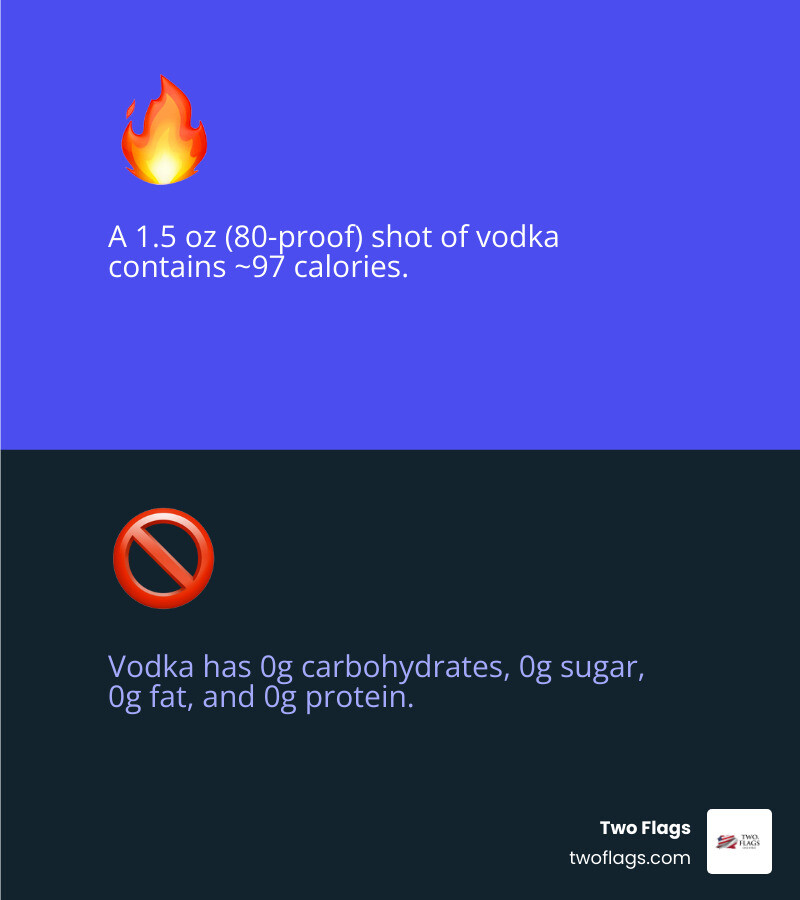
Easy does vodka have calories glossary:
So, Does Vodka Have Calories? A Detailed Breakdown
The short answer to "does vodka have calories" is yes – and understanding where those calories come from helps explain why vodka is different from other alcoholic drinks.
Every calorie in vodka comes from ethanol, the pure alcohol that makes up the spirit. Think of vodka as essentially alcohol and water – that's it. The ethanol is what gives vodka its kick, and it's also what contributes all the calories.
Here's something that surprises many people: alcohol contains 7 calories per gram. That's nearly twice as many calories as carbohydrates or protein (4 calories per gram each), and only slightly less than fat (9 calories per gram). So when you sip Two Flags One Spirit vodka, you're consuming a fairly calorie-dense beverage.
But here's the catch – these are what nutritionists call "empty calories." Unlike the calories you get from food, vodka calories don't come with any vitamins, minerals, fiber, or other nutrients your body needs. It's pure energy without the nutritional benefits.
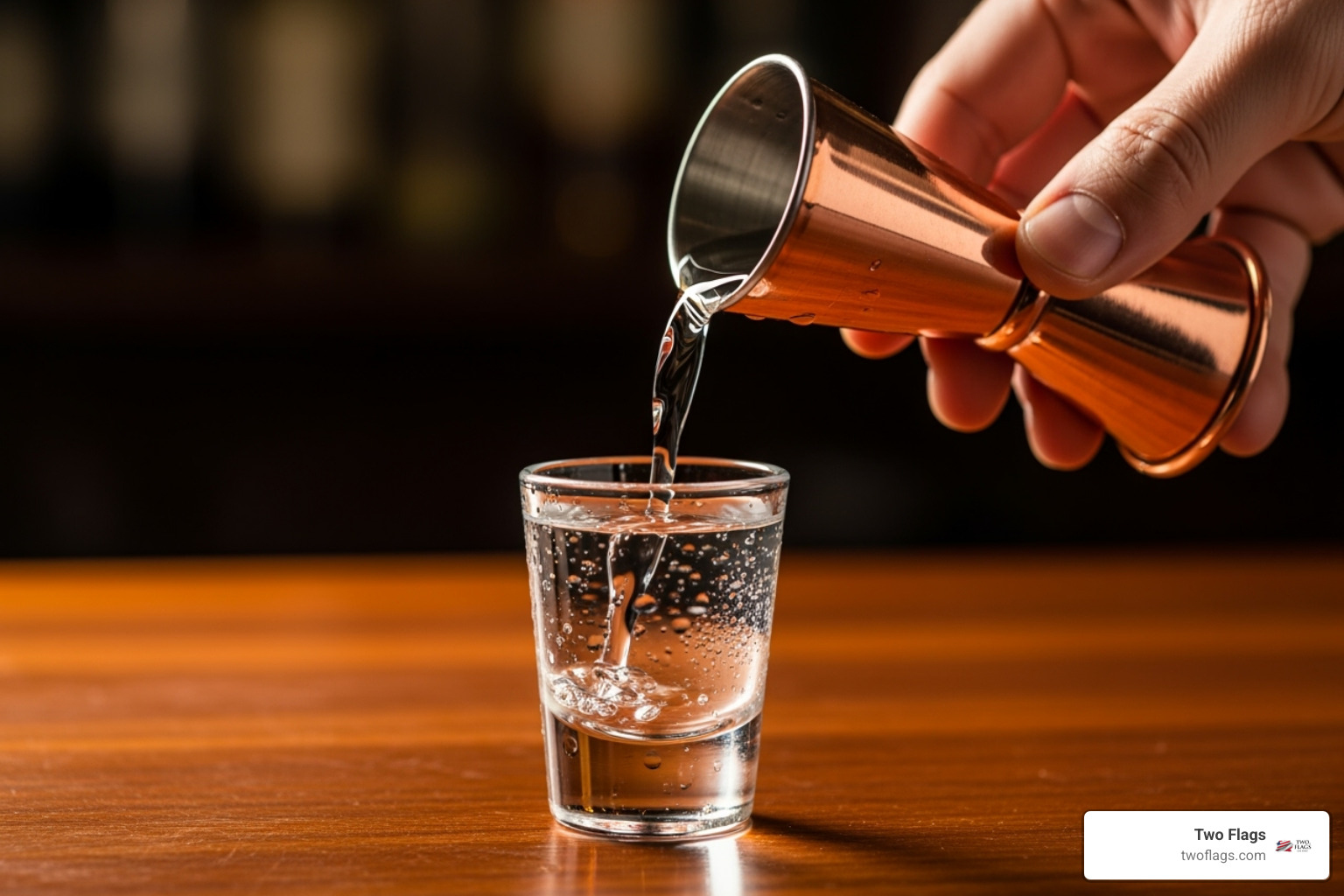
How many calories does a standard shot of vodka have?
A standard 1.5-ounce shot of 80-proof vodka contains approximately 96-97 calories. This is true whether you're drinking Two Flags One Spirit or any other 80-proof vodka – the calorie count stays consistent because it's based purely on alcohol content.
When we say "80-proof," we're talking about vodka that's 40% alcohol by volume. This is the most common strength you'll find, and it's what we use for Two Flags One Spirit. The remaining 60% is water, which adds no calories.
Those 97 calories come entirely from the alcohol itself. There are no hidden sugars, carbs, or fats contributing to the calorie count. This makes vodka's calorie content very predictable and straightforward to calculate.
What is the calorie content of different proofs of vodka?
The proof of vodka directly affects its calorie content. Higher proof means more alcohol, and more alcohol means more calories. It's that simple.
Proof is just double the alcohol by volume percentage. So 80-proof vodka is 40% alcohol, while 100-proof vodka is 50% alcohol. Here's how different proofs of Two Flags One Spirit would compare in a standard 1.5-ounce serving:
| Proof (ABV%) | Calories per 1.5 oz serving |
|---|---|
| 70 proof (35%) | 85 calories |
| 80 proof (40%) | 96-97 calories |
| 90 proof (45%) | 110 calories |
| 100 proof (50%) | 124 calories |
The difference can be significant. Moving from 80-proof to 100-proof vodka adds about 27 extra calories per shot. That might not sound like much, but it adds up quickly if you're having multiple drinks.
What is the calorie breakdown of vodka?
Here's where vodka gets interesting from a nutritional standpoint. The calorie breakdown is remarkably simple because vodka contains virtually zero macronutrients except alcohol.
Zero carbohydrates – Even though vodka starts with carb-rich ingredients like wheat or potatoes, the distillation process removes all carbohydrates. This is why vodka works well for low-carb diets.
Zero sugar – The fermentation process converts any sugars into alcohol, and distillation purifies everything further. Plain vodka like Two Flags One Spirit contains no residual sugars.
Zero fat and zero protein – You won't find either of these macronutrients in pure vodka.
This means every single one of those 97 calories in a standard shot comes from alcohol. It's a unique beverage in this way – pure alcohol calories without any accompanying nutrients. This simplicity is actually what makes vodka appealing to many health-conscious drinkers who want to know exactly what they're consuming.
How Vodka's Calories Compare to Other Alcoholic Beverages
If you're wondering does vodka have calories compared to your other favorite drinks, you'll be pleasantly surprised. Vodka consistently ranks as one of the smartest choices for anyone watching their calorie intake, and the numbers tell a compelling story.
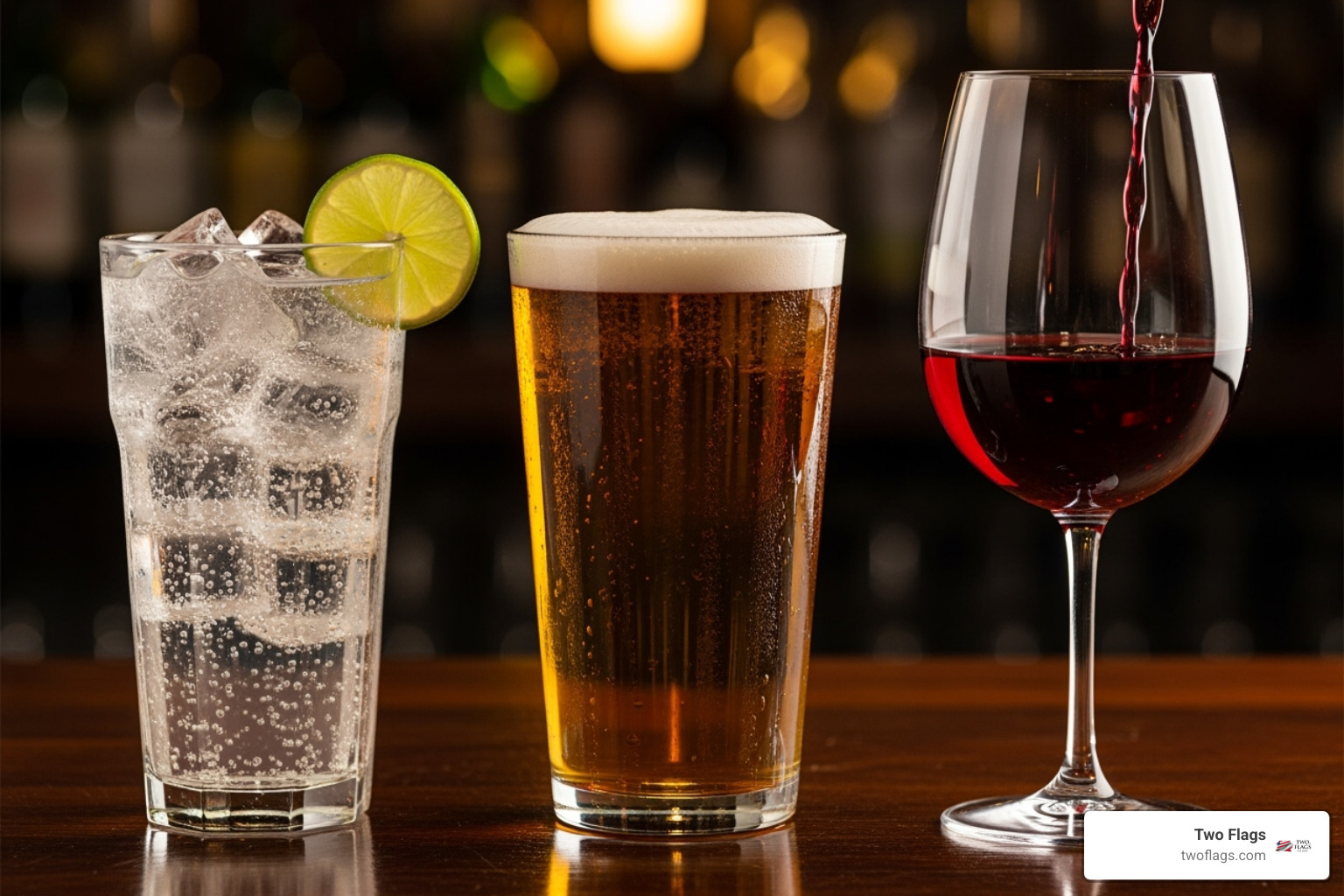
Vodka vs. Beer
Here's where things get interesting. That 1.5-ounce shot of Two Flags One Spirit vodka contains about 97 calories, while a standard 12-ounce beer packs around 153 calories. At first glance, beer might not seem that much higher, but remember - you're comparing a small shot to a full bottle or can.
The real game-changer lies in the carbohydrates. While our vodka contains zero grams of carbs, that same 12-ounce beer delivers 10 to 15 grams of carbohydrates. Even light beers, often marketed as the "healthier" option, still contain about 103 calories per 12-ounce serving plus several grams of carbs.
If you're following a low-carb lifestyle or simply want to avoid the bloating that comes with beer's carb content, vodka offers a clean alternative. You get the social enjoyment without the carb crash later.
Vodka vs. Wine
Wine lovers often assume they're making a lighter choice, but let's look at the facts. A standard 5-ounce glass of red wine contains approximately 125 calories, while white wine comes in slightly higher at around 128 calories. That's more than our 97-calorie shot of Two Flags One Spirit vodka.
Wine also brings residual sugars to the party - something our vodka completely avoids. While dry wines contain less sugar than sweet varieties, they still can't match vodka's zero sugar content. And if you're tempted by dessert wines, those numbers climb dramatically with both calories and sugar content.
The beauty of choosing vodka is its predictability. You know exactly what you're getting every time, without worrying about vintage variations or sugar levels.
Why is vodka considered a low-calorie alcoholic beverage?
The secret lies in vodka's distillation process. When we craft Two Flags One Spirit vodka, the distillation effectively strips away everything except alcohol and water from the original grain base. This purification removes all carbohydrates, sugars, fats, and proteins, leaving behind only the essential alcohol calories.
This puts vodka in a completely different league from many other alcoholic beverages. Liqueurs, for example, often contain added sugars, creams, or flavorings that can push a 1.5-ounce serving up to 165 calories or more. Pre-mixed cocktails can be even worse - some tropical drinks exceed 380 calories per serving, loaded with hidden sugars and artificial ingredients.
Even seemingly innocent mixed drinks can surprise you. A vodka lemonade might sound light, but it can easily reach 200 calories with 26 grams of carbs once you add the sweet mixer. That's why starting with a pure base like Two Flags One Spirit vodka gives you complete control over your drink's final calorie count.
Our ultra-premium, organic, and gluten-free vodka embodies this purity philosophy. Every calorie comes from quality alcohol alone, with no unwanted extras hiding in your glass. This makes it the perfect foundation for creating lighter, more health-conscious cocktails that don't compromise on taste or quality.
Beyond the Bottle: How Mixers and Flavors Impact Your Drink
Here's where things get interesting – and where many people get surprised by their calorie intake. While our Two Flags One Spirit vodka keeps things simple at 97 calories per shot, what you mix it with can completely transform your drink's nutritional profile. I've seen too many health-conscious friends think they're being good by choosing vodka, only to realize their "light" drink packed more calories than a slice of pizza!
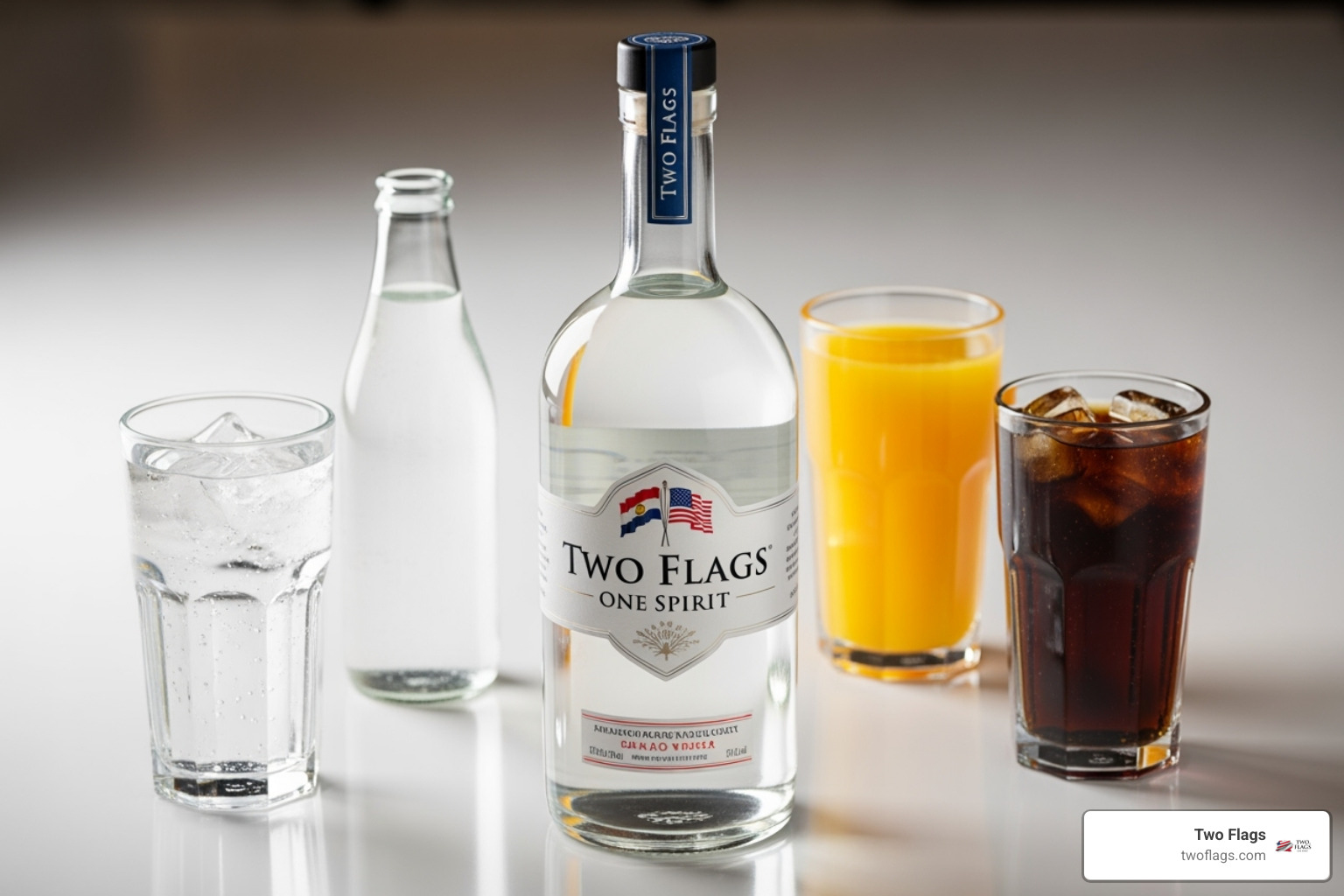
How do mixers affect the calorie count of vodka drinks?
The mixer you choose can easily double, triple, or even quadruple your drink's calories. Those sugary mixers are the real culprits hiding behind innocent-looking cocktails.
Take a classic vodka and cola. Your 1.5 oz shot of Two Flags One Spirit contributes 97 calories, but add 8 oz of regular cola and you've just added another 107 calories. Suddenly your "light" vodka drink is pushing 204 calories – more than many beers!
Fruit juices might seem healthy, but they're sugar bombs in disguise. Orange juice packs about 112 calories per cup, while cranberry juice hits 116 calories with a hefty 31 grams of carbs. That innocent-looking vodka cranberry? You're looking at nearly 200 calories when made with full-strength juice.
Even tonic water fools people. Many assume it's basically flavored water, but regular tonic contains sugar – about 80 calories per 8 oz serving. Your vodka tonic just jumped to 177 calories.
Energy drinks are perhaps the worst offenders. Mix vodka with a full can of energy drink and you could be looking at over 250 calories in a single drink. That's when people ask does vodka have calories and realize the vodka wasn't the problem – it was everything else in the glass!
What are the nutritional differences between plain and flavored vodkas?
Here's some good news that surprises many people: most infused vodkas don't actually contain more calories than plain vodka like our Two Flags One Spirit. When vodka is flavored with natural or artificial flavoring without added sugars, the calorie count stays virtually the same – still around 97 calories per 1.5 oz shot.
The confusion comes from pre-mixed cocktails that get lumped together with flavored vodkas. These bottled drinks often contain added sugars, syrups, and other ingredients that can skyrocket the calorie count. A pre-mixed lemonade vodka cocktail might pack 200 calories and 26 grams of carbs – more than double what you'd get from plain vodka.
The key is reading labels carefully. True infused vodkas will list natural or artificial flavors but shouldn't show added sugars or corn syrup. If you see those ingredients, you're looking at a sweetened product that will have significantly more calories than our pure, distilled Two Flags One Spirit.
Most artificial sweeteners used in some flavored vodkas add negligible calories, so the math stays pretty much the same as plain vodka. The real calorie bombs are the products that use real sugar for sweetness.
Strategies for a Low-Calorie Vodka Drink
The secret to enjoying vodka without derailing your calorie goals isn't complicated – it's all about smart mixer choices. You can create delicious, satisfying drinks that keep the calorie count reasonable.
Soda water and club soda are absolute game-changers. They add fizz, volume, and refreshment without a single calorie. Mix 1.5 oz of Two Flags One Spirit with sparkling water and a lime wedge, and you're still sitting pretty at just 97 calories.
Diet sodas give you familiar flavors without the sugar crash. While they're not everyone's preference, they let you enjoy that cola or ginger ale taste without adding 100+ calories to your drink.
Fresh citrus is where you can get creative without consequences. A squeeze of fresh lemon, lime, or grapefruit adds bright, natural flavor for just a few calories. The oils from the citrus peel add even more aroma and taste complexity.
Herbs and fresh ingredients can transform your drink into something special. Muddle some fresh mint for a refreshing twist, add cucumber slices for a spa-like feel, or throw in some jalapeño for heat – all with virtually zero caloric impact.
When you do want some fruit juice flavor, try diluting it with soda water. Half orange juice, half sparkling water gives you the taste you crave while cutting the calories in half. You can also look for low-sugar or no-sugar-added juice options.
The most important strategy? Measure your pours. Using a jigger ensures you know exactly how much vodka you're consuming, which helps you track calories accurately and avoid accidentally heavy-handed pours that can throw off your goals.
Alcohol's Effect on Weight Management
When people ask does vodka have calories that matter for weight loss, they're often surprised by the complexity of the answer. Vodka has calories - about 97 per shot of our Two Flags One Spirit - but the real story goes much deeper than that simple number.
Your body treats alcohol differently than other calories, and understanding this difference is crucial for anyone trying to manage their weight. It's not just about counting the calories in your glass; it's about what happens inside your body after you drink.
Does vodka have calories that affect weight loss?
Absolutely, and here's why those vodka calories pack more of a punch than you might expect. Even though our Two Flags One Spirit vodka contains zero carbs, zero sugar, and zero fat, those 97 calories per shot are what nutritionists call "empty calories."
Think of it this way: when you eat an apple, you get calories plus fiber, vitamins, and minerals that your body can use. When you drink vodka, you get pure caloric energy with no nutritional benefits whatsoever. Your body still has to do something with those calories, but it gets nothing useful in return.
Weight loss comes down to burning more calories than you consume, and every calorie counts toward that equation. A couple of shots of vodka can easily add 200 calories to your day - that's roughly equivalent to a small meal. These calories add up faster than most people realize.
Research shows that drinking alcohol typically increases a person's daily calorie intake, which can contribute to weight gain. Many people track their food carefully but forget to account for their drinks. One person shared their frustration online: despite working out regularly, they couldn't lose weight until they realized their evening vodka was quietly sabotaging their calorie deficit.
How Alcohol Interferes with Fat-Burning
Here's where things get really interesting. Your liver treats alcohol like a toxin that needs immediate attention. When you drink that shot of Two Flags One Spirit, your liver drops everything else it's doing to focus on breaking down the alcohol first.
This creates what scientists call the "fat-sparing effect." While your liver is busy processing alcohol, it essentially puts fat burning on hold. Fat metabolism comes to a screeching halt while your body uses the alcohol for energy instead.
Think of your metabolism like a busy restaurant kitchen. When alcohol arrives, it's like a rush order that bumps everything else down the line. Your body burns the alcohol calories first, which means any dietary fats you've eaten - or the fat stored on your body - gets pushed to the back burner.
This doesn't mean you'll gain weight from one drink, but it does mean your fat-burning process gets interrupted. If you're trying to lose weight, these metabolic pauses can slow your progress, even if you're staying within your calorie goals.
Alcohol's Impact on Appetite and Food Choices
Perhaps the sneakiest way alcohol affects weight management isn't through its own calories, but through how it changes your eating behavior. Research shows that drinking alcohol increases appetite while reducing feelings of fullness.
Ever notice how a few drinks make you crave salty, fatty foods? That's not coincidence - it's biology. Alcohol affects the hormones that control hunger and satiety, making you feel hungrier and less satisfied by the food you eat.
The result is often poor food choices and larger portions. You might start the evening with a perfectly planned 97-calorie vodka soda, but end up ordering late-night takeout or reaching for high-calorie snacks. Many people find themselves making food decisions after drinking that they'd never make sober.
The morning after can be just as problematic. Hangovers often trigger cravings for greasy, high-carb comfort foods. Your body is dehydrated and your blood sugar is unstable, leading to powerful urges for foods that provide quick energy - usually in the form of excess calories.
So while our Two Flags One Spirit vodka offers a clean, low-calorie drinking experience, being aware of alcohol's broader effects on your metabolism and appetite will help you make smarter choices for your weight management goals.
Frequently Asked Questions about Vodka and Calories
We hear these questions all the time at Two Flags, especially from health-conscious customers who want to enjoy our premium vodka while staying mindful of their wellness goals. Let me share the answers to the most common questions we get about vodka and calories.
Does vodka contain carbohydrates, sugar, or fat?
Here's the straightforward answer: No, vodka does not contain carbohydrates, sugar, or fat. This might seem surprising given that vodka starts its life as carb-rich ingredients like wheat, corn, or potatoes, but the distillation process works magic here.
During fermentation, those original carbohydrates get converted into alcohol. Then comes the distillation process - this is where the real change happens. The rigorous distillation purifies the alcohol by separating it from everything else in the fermented mash. What gets left behind? All those carbohydrates, sugars, fats, and proteins that were in the original ingredients.
What you end up with in your bottle of Two Flags One Spirit vodka is essentially just ethanol and water - nothing else. Every single calorie comes from the alcohol itself, which is why vodka has calories but zero macronutrients. This pure composition is exactly why vodka becomes such a popular choice for people following keto, low-carb, or sugar-free lifestyles.
Are there strategies to drink vodka while managing calorie intake?
Absolutely! You don't have to give up enjoying Two Flags One Spirit vodka just because you're watching your calories. Smart drinking is all about making informed choices and having a plan.
Choosing zero-calorie mixers is your best friend here. Mix your vodka with soda water, club soda, or a splash of fresh lime juice. These additions give you flavor and fizz without sneaking in extra calories. Measuring your pours makes a huge difference too - it's easy to accidentally pour a double when you're eyeballing it, but using a jigger keeps you at that standard 1.5-ounce serving with its 97 calories.
Alternating with water between drinks helps slow things down and keeps you hydrated. For every vodka drink, have a glass of water. This simple trick naturally reduces your overall alcohol intake for the evening.
The key is accounting for alcohol calories in your daily total. Think of those vodka calories like you would any other treat - maybe skip the dessert or that afternoon snack to make room for your evening drink. Planning ahead works wonders too. If you know you'll be having drinks with friends, eat lighter meals earlier in the day.
Moderation matters. The American Heart Association suggests no more than one drink per day for women and two for men. Sticking to these guidelines naturally helps keep calories in check while letting you enjoy our premium vodka responsibly.
How many calories are in a vodka soda?
A vodka soda is hands down one of the smartest choices you can make at a bar when you're counting calories. When you order one made with a standard 1.5-ounce shot of 80-proof Two Flags One Spirit vodka, you're looking at approximately 97 calories total.
The beauty of this drink lies in its simplicity. Soda water - whether it's club soda or sparkling water - contains absolutely zero calories, zero sugar, and zero carbohydrates. It's just carbonated water that adds that satisfying fizz and volume to your drink without adding anything to your calorie count.
This makes the vodka soda a perfect example of how understanding does vodka have calories can help you make better choices. All 97 of those calories come purely from the alcohol in our premium vodka - there are no hidden sugars or surprise calories lurking in your glass. It's clean, refreshing, and honest about exactly what you're consuming.
Conclusion
So, does vodka have calories? Absolutely, and now you have the complete picture. Every sip of vodka delivers calories - about 97 per standard shot - but understanding these calories makes all the difference in your drinking choices.
What makes vodka unique is its pure simplicity. Unlike other alcoholic beverages loaded with carbs, sugars, and additives, vodka's calories come from just one source: the alcohol itself. Our Two Flags One Spirit vodka exemplifies this purity - zero carbohydrates, zero sugar, zero fat. Just clean, premium alcohol and water.
This nutritional profile puts vodka at the top of the low-calorie alcohol list. While a beer might pack 150+ calories plus carbs, and wine adds residual sugars, vodka keeps things straightforward. But here's where many people trip up - those innocent-looking mixers can turn your 97-calorie drink into a 300-calorie sugar bomb faster than you can say "cranberry juice."
The bigger picture involves how alcohol affects your body beyond just calories. "Fat-sparing" effect we discussed? Your liver prioritizes processing alcohol over burning fat, which can stall weight loss efforts. Add alcohol's sneaky way of increasing appetite and weakening food decision-making, and you've got a perfect storm for unplanned calories.
Smart choices and moderation remain your best friends here. Stick with soda water mixers, measure your pours, and account for those alcohol calories in your daily total. Think of them as part of your treat budget - maybe skip the dessert if you're planning a vodka soda with friends.
Two Flags One Spirit represents everything we've discussed about premium, clean vodka. Crafted authentically in Poland, our organic and gluten-free spirit gives you the purest possible vodka experience. It's the ideal foundation for health-conscious cocktails that won't derail your goals.
Whether you're counting calories, following a low-carb lifestyle, or simply want to make informed choices about alcohol, understanding does vodka have calories empowers you to enjoy responsibly. For those ready to explore premium spirits further, check out our A guide to premium vodka to find what sets exceptional vodka apart.
Here's to making choices you can feel good about - cheers!


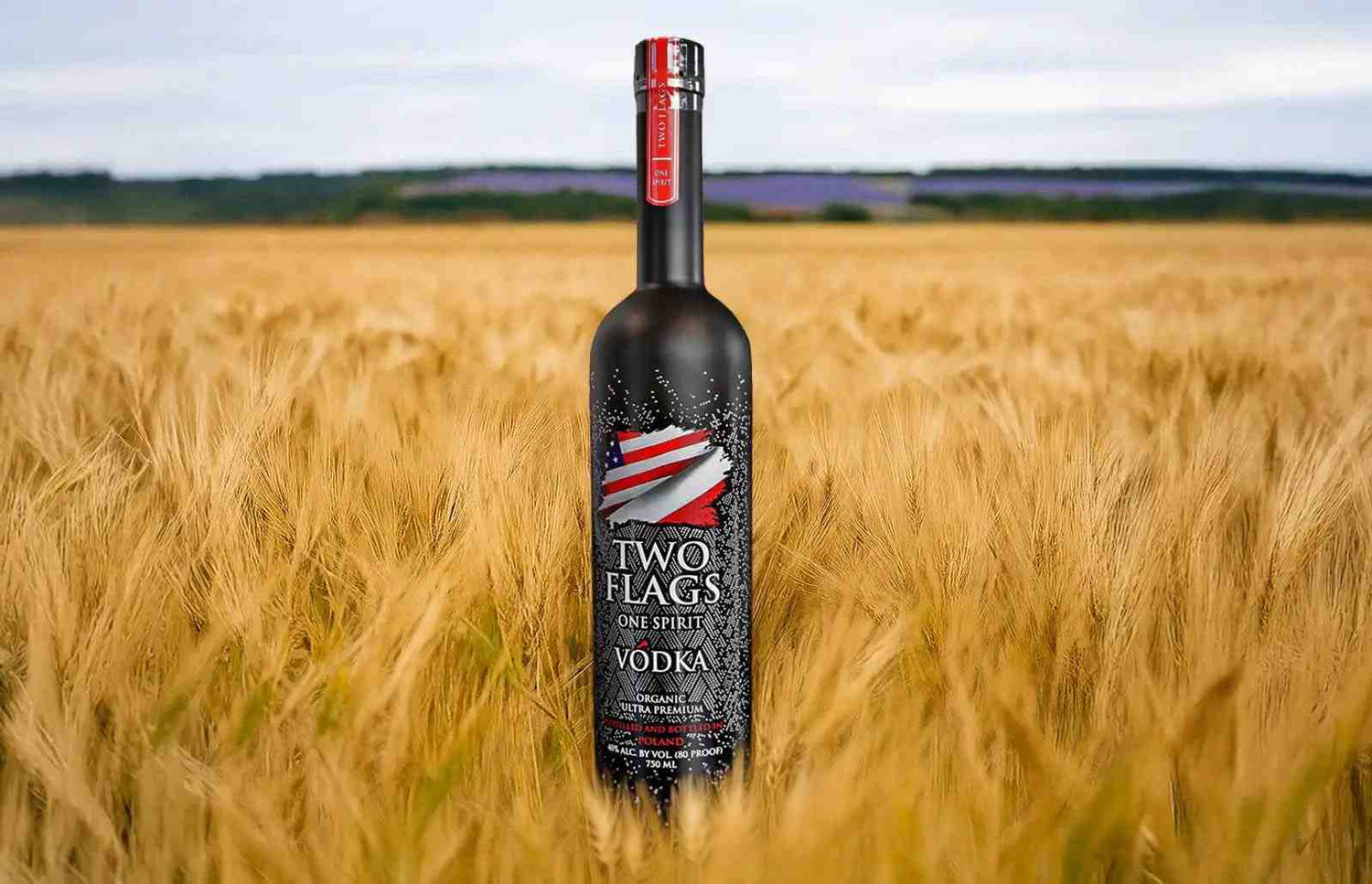
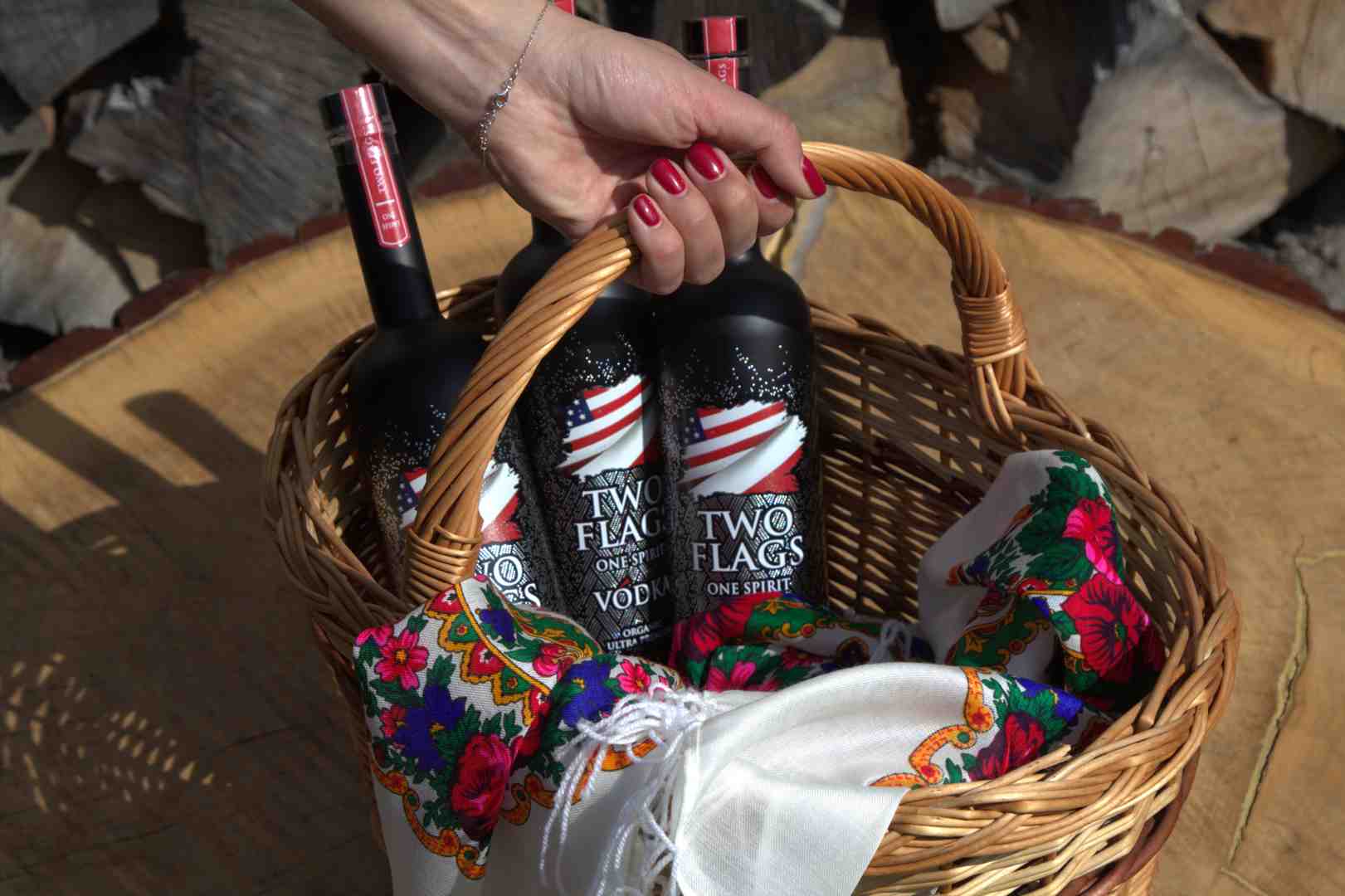
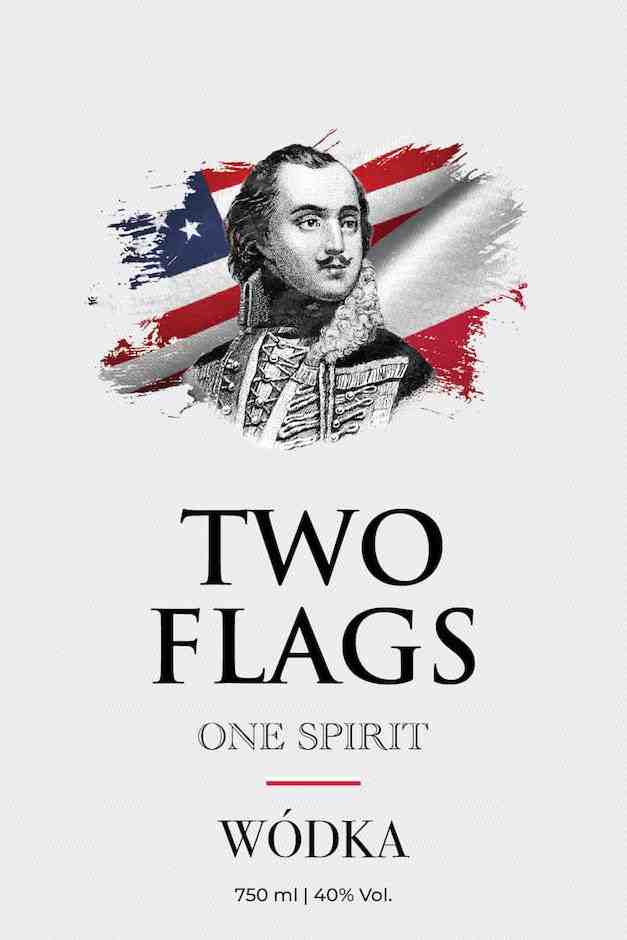
Zostaw komentarz
Ta strona jest chroniona przez hCaptcha i obowiązują na niej Polityka prywatności i Warunki korzystania z usługi serwisu hCaptcha.